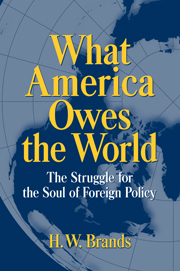Book contents
- Frontmatter
- Contents
- Preface
- 1 Exceptionalists All! The First Hundred Years
- 2 Brooks Adams: Marx for Imperialists
- 3 Walter Lippmann and a New Republic for a New Era
- 4 When the Future Worked and the Trains Ran on Time: Lincoln Steffens
- 5 Dr. Beard's Garden
- 6 Kennan, Morgenthau, and the Sources of Superpower Conduct
- 7 Reinhold Niebuhr and the Foreign Policy of Original Sin
- 8 God Blinked but Herman Didn't
- 9 On Wisconsin: Madison and Points Left
- 10 The Brief of Norman's Woe: Commentary and the New Conservatism
- 11 It Ain't Over till It's Over – and Not Even Then
- Note on Sources
- Index
3 - Walter Lippmann and a New Republic for a New Era
Published online by Cambridge University Press: 25 March 2010
- Frontmatter
- Contents
- Preface
- 1 Exceptionalists All! The First Hundred Years
- 2 Brooks Adams: Marx for Imperialists
- 3 Walter Lippmann and a New Republic for a New Era
- 4 When the Future Worked and the Trains Ran on Time: Lincoln Steffens
- 5 Dr. Beard's Garden
- 6 Kennan, Morgenthau, and the Sources of Superpower Conduct
- 7 Reinhold Niebuhr and the Foreign Policy of Original Sin
- 8 God Blinked but Herman Didn't
- 9 On Wisconsin: Madison and Points Left
- 10 The Brief of Norman's Woe: Commentary and the New Conservatism
- 11 It Ain't Over till It's Over – and Not Even Then
- Note on Sources
- Index
Summary
Never a majority mood, Brooks Adams's pessimism was more out of place than ever during Woodrow Wilson's first term. The progressives who elected Wilson in 1912, as well as many of those who voted for Roosevelt, were not anti-determinists. They believed, for example, that the conditions in which individuals grew up and found themselves as adults strongly influenced their behavior – hence their emphasis on settlement work, child labor laws, minimum wages, and the like, which would improve society by fostering the improvement of individuals. But the progressives’ determinism fell far short of what Adams had in mind when he described the emergence and decay of civilizations. Because it did, and because it allowed a large role for efforts at social betterment, its adherents found Adams's morbidness foreign.
The imperialism that had set Adams thinking about his grand themes likewise appeared out of place, at least as it applied to America. The war in the Philippines had demonstrated to Americans that holding an empire cost more than acquiring one, and they experienced no difficulty resisting the temptation to enlarge theirs. Besides, empire had always been more a Republican than a Democratic enthusiasm, and as American voters’ enthusiasm for Republicans waned – evidenced most conspicuously in the Democratic landslide of 1910 – so did the country's attachment to empire. In nominating Wilson in 1912, the Democrats stood him on an explicitly anti-imperialist platform.
- Type
- Chapter
- Information
- What America Owes the WorldThe Struggle for the Soul of Foreign Policy, pp. 47 - 78Publisher: Cambridge University PressPrint publication year: 1998



